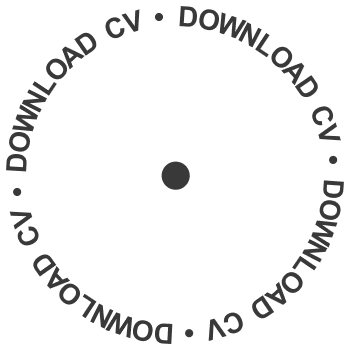LOGO
NAME SURNAME
WHATS YOUR POWER
The Bauhaus was founded in 1919 in the city of Weimar by German architect Walter Gropius.
Its core objective was a radical concept: to reimagine the material world to reflect the unity of all the arts.
(01)
WELCOME
SAY HI


ABOUT ME
Gropius developed a curriculum that would turn out artisans and designers capable of creating useful and beautiful objects appropriate to this new system of living.
Gropius developed a curriculum that would turn out artisans and designers capable of creating useful and beautiful objects appropriate to this new system of living.
(02)
ABOUT YOU
5
1991
80/20
MAIN STEPS
Empathize, Define, Ideate, Prototype and Test
THE FIRST SYMPOSIUM
Held at Delft University, The Netherlands
PARETO PRINCIPLE
That actively used in design thinking
FACTS
(03)
WE IN NUMBERS
The Bauhaus movement had a profound influence upon subsequent developments in art, architecture, graphic design, interior design, industrial design, and typography.
ADVANTAGE №1
ADVANTAGE №2
The Bauhaus was founded by architect Walter Gropius in Weimar. It was grounded in the idea of creating a Gesamtkunstwerk ("comprehensive artwork") in which all the arts would eventually be brought together.
ADVANTAGE №3
ADVANTAGE №4
After Germany's defeat in World War I and the establishment of the Weimar Republic, a renewed liberal spirit allowed an upsurge of radical experimentation in all the arts, which had been suppressed by the old regime.
Many Germans of left-wing views were influenced by the cultural experimentation that followed the Russian Revolution, such as constructivism.
ADVANTAGES
(04)
OUR BENEFITS


PROJECTS
(05)
TAKE A LOOK

2019
PROJECT №1

2018
PROJECT №2

2017
PROJECT №3

2016
PROJECT №4

2015
PROJECT №5
PEOPLE
(06)
OUR COMMAND
Miriam Carver
Zoe Gerard
Vincent Mayer
Control Design & Effectiveness
Lead designer
Head of Creative
HOW IT WORKS
(07)
STEP BY STEP
04
03
The aim is to identify the best possible solution for each problem found. And teams often use the results to redefine one or more further problems.
Now, you’re ready to generate ideas. Brainstorming is particularly useful here.
START TO CREATE SOLUTIONS AND TRY IT OUT
CHALLENGE ASSUMPTIONS AND CREATE IDEAS
Here, you should gain an empathetic understanding of the problem you’re trying to solve, typically through user research.
STATE YOUR USERS' NEEDS AND PROBLEMS
RESEARCH YOUR USERS' NEEDS
It’s time to accumulate the information gathered during the Empathize stage.
02
01
GALLERY
(08)
PICTURES
HOWEVER, THE MOST IMPORTANT INFLUENCE ON BAUHAUS WAS MODERNISM, A CULTURAL MOVEMENT WHOSE ORIGINS LAY AS EARLY AS THE 1880S, AND WHICH HAD ALREADY MADE ITS PRESENCE FELT IN GERMANY BEFORE THE WORLD WAR, DESPITE THE PREVAILING CONSERVATISM.
HOWEVER, THE MOST IMPORTANT INFLUENCE ON BAUHAUS WAS MODERNISM, A CULTURAL MOVEMENT WHOSE ORIGINS LAY AS EARLY AS THE 1880S, AND WHICH HAD ALREADY MADE ITS PRESENCE FELT IN GERMANY BEFORE THE WORLD WAR, DESPITE THE PREVAILING CONSERVATISM.
REVIEWS
(09)
PEOPLE TALK



Many Germans of left-wing views were influenced by the cultural experimentation that followed the Russian Revolution, such as constructivism.
After Germany's defeat in World War I and the establishment of the Weimar Republic, a renewed liberal spirit allowed an upsurge of radical experimentation in all the arts, which had been suppressed by the old regime.
REVIEW №4
REVIEW №3
The Bauhaus was founded by architect Walter Gropius in Weimar. It was grounded in the idea of creating a Gesamtkunstwerk ("comprehensive artwork") in which all the arts would eventually be brought together.
REVIEW №2
REVIEW №1
The Bauhaus movement had a profound influence upon subsequent developments in art, architecture, graphic design, interior design, industrial design, and typography.

QUESTIONS
(10)
FAQ
We are the leading firm by delivering quality and value to our clients. All our professionals have more than 5 years of legal experiences. We like what we do.
Our managers are always ready to answer your questions. You can call us at the weekends and at night. Also you can visit our office for personal consultation.
Our company works according to the principle of individual approach to every client. This method lets us to get success in problems of all levels.
Our company works according to the principle of individual approach to every client. This method lets us to get success in problems of all levels.
Our company works according to the principle of individual approach to every client. This method lets us to get success in problems of all levels.
CONTACTS
(11)
DROP A LINE
INSTAGRAM
LINKEDIN
FACEBOOK
All photo and video materials from free resources unsplash.com and pexels.com belong to their owners. All photographs, texts, and business descriptions are fictitious. Please don’t use the template content for commercial purposes.
Attention!
This template requires custom fonts. Set them up manually before using this template.
Heading font: Cormorant Garamond
Body text font: Inter
How to connect fonts:
1. Go to Site settings → Fonts and Colors → Google Fonts
2. Fill out the following input fields:
CSS link: https://fonts.googleapis.com/css2?family=Cormorant+Garamond:wght@500&family=Inter&display=swap
Heading font family name: Cormorant Garamond
Body text font family name: Inter
3. Open each block, select text elements, go to the settings, and change the typeface to Cormorant Garamond and Inter
Learn more about setting up custom fonts:
https://help.tilda.сс/fonts
See the original page design here: https://leonardo-template.tilda.ws
This template requires custom fonts. Set them up manually before using this template.
Heading font: Cormorant Garamond
Body text font: Inter
How to connect fonts:
1. Go to Site settings → Fonts and Colors → Google Fonts
2. Fill out the following input fields:
CSS link: https://fonts.googleapis.com/css2?family=Cormorant+Garamond:wght@500&family=Inter&display=swap
Heading font family name: Cormorant Garamond
Body text font family name: Inter
3. Open each block, select text elements, go to the settings, and change the typeface to Cormorant Garamond and Inter
Learn more about setting up custom fonts:
https://help.tilda.сс/fonts
See the original page design here: https://leonardo-template.tilda.ws

